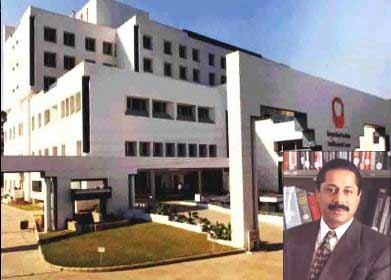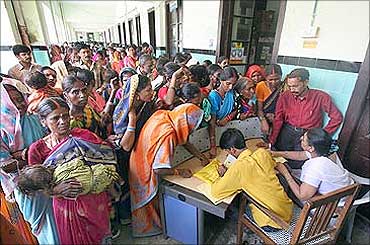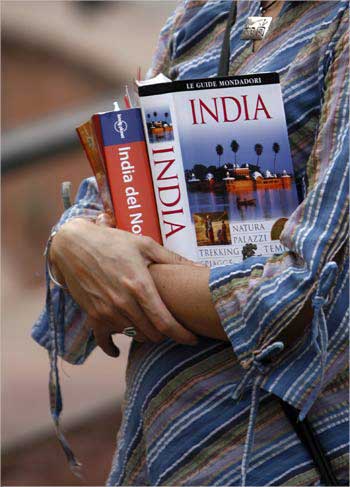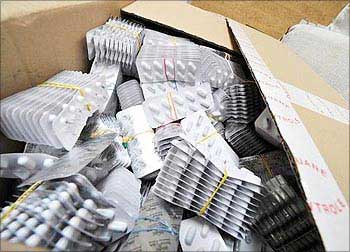
Naresh Trehan is confident the world-class medical care offered at his new hospital facility in Gurgaon will make it profitable in a year.
As he walks down the alley from his operation theatre, the well-known doctor in his sea-blue surgical uniform and with animated gestures describes the passion of growing his new baby to 'be a John Hopkins Hospital or a Cleveland Clinic of the East'.
Naresh Trehan says with undisguised pride about his new venture, Medanta -- the Medicity, in Gurgaon: "You will not find a clinic of this quality anywhere between Germany and Japan."
What makes him so confident? Trehan says that he has done it before at the Escorts Heart Institute and Research Centre in New Delhi.
"Escorts set the standard for healthcare in India when I joined in 1988," says he, sitting in his first-floor plush and sprawling chamber above the emergency ward looking out to the rest of Gurgaon. "All India Institute of Medical Sciences had the potential to reach there, but alas!"
. . .

Trehan had a 10 per cent stake in the Escorts Heart Institute and Research Centre but left in 2007 after it was taken over by Fortis Healthcare.
Trehan too was in the race to acquire the hospital from Rajan Nanda of Escorts, and had tied up with some private equity funds for this purpose, but lost out to Fortis Healthcare. He then worked for Apollo Hospitals. And now his hospital is ready.
"The whole idea of Medanta is built on the premise of serving quality medical care to the nation of a billion at an affordable cost," says Trehan, catching up with his patients in between the discussions.
Of course, he is upbeat on the prospects. In fact, Trehan is already in talks to build a smaller version of Medanta in East Africa!
"For 20 years in New York as a teacher and researcher, I would wonder how to reverse the trend of Indians paying through the nose to come to the US for healthcare," says Trehan.
Today, Trehan says he has reversed the flow and patients from 22 countries, including those in North America and Europe, have come to his institute for treatment.
. . .

Business plan
All this is fine. But what are the business projections?So far, Trehan has invested Rs 1,000 crore (Rs 10 billion), funded by the promoters and private equity funds, for the 400-bed facility.
This means that each bed has cost him Rs 2.5 crore (Rs 25 million) -- this is more than what it costs to build a room in a five-star hotel in the country!
Of course, the per-bed cost will drop as Trehan scales up, but the current costs are abnormally high.
For Fortis Healthcare, the largest chain of hospitals in the country, the average cost is less than Rs 50 lakh (Rs 5 million) a bed.
Sector experts insist that it is possible to build a decent hospital at Rs 25 lakhs (Rs 2.5 million) a bed. How then does Trehan plan to break even?
Trehan, on his part, is confident of reaching a gross profit margin of 12-15 per cent in the next one year.
So much so, the business plan he has sold to private equity funds talks of an initial public offer in two or three years, which will provide them an exit from the company.
. . .

Trehan describes Medanta as a multi-super-specialty medical institute with a wide spectrum of clinical care, education and research. Trehan says it has the highest quality of healthcare facilities that the world can afford.
"I do not charge my patients for time. I give them collective treatment and charge an affordable rate," says the doctor who has got almost all the best specialists in their fields to work for him at the Medicity.
Trehan also does not fail to mention that the building, designed by four companies in Canada represented in the country by a group called Arcop, is medically treated.
"The building is designed such that no doctor is more than a minute away from a patient. Natural air circulation and through vents is twice as much as an ordinary structure to maintain optimum level of hygiene," informs Trehan.
He adds that even the materials used in construction are highly sterile products. "Good medicare will make good business, not the other way round." And, "ours is a business made by doctors, driven by doctors".
Trehan is primarily depending on playing the volumes game, scaling up operations fast and replicating the Escorts model of being patient with making profits.
"Return on investments came over a period of 17-18 years at Escorts. We were patient then. I am patient now, with Medanta. I will be happy to make some profit from it in the next one year," says a confident Trehan.
. . .

He claims to be charging 50 per cent less with the best services in the world than what doctors make independently. Trehan does not explain how this will translate into profits.
Also, for five per cent of the poor, he has kept Medanta services free and 20 per cent subsidised for those who are unable to pay for the services they avail or need.
"I have not used gold or granite in the hospital. The most luxurious material in my hospital is marble," he justifies his costs for building Medanta.
His second justification: Have a cross-section of patients -- from a whole host of international visitors to high net worth Indian individuals, and, of course, then the middle class and the poor.
Trehan says his business of healthcare with Medanta will succeed if he is able to "add life to the years, not just years to life".
Investment priorities
Investments in technology and minute details have been his priority for this purpose.
"Led and managed by world-renowned doctors committed to care with compassion, we are offering a dream service with cutting-edge technology and state-of-the-art treatment," says Trehan, informing that technology alone has till now cost him over Rs 300 crore (Rs 3 billion).
It is still clocking higher, he adds.
His next thrust is to build world-class research not only in modern medicine, but work on amalgamating traditional Indian medicine with modern healthcare.
"This will make healthcare affordable, since invasive medicine in modern days is expensive."
. . .

Trehan is now actively working on setting up micro-organisations in research under the Medanta brand name for collaborations with the rest of the world on new frontiers in neurosciences, cancer, and bone and joint treatment.
In this regard, he has gone on a whirlwind tour of the globe. Already tied up for seven collaborations in six countries in 12 days, Trehan plans to announce one tie-up each in healthcare and research every 60 days for six months from this month.
But there is no stopping after that. He is already planning to bring in India predictive healthcare, wherein Medanta can predict the illnesses one can acquire by analysing one's lifestyle and living pattern.
Trehan admits he is the brand that drives Medanta. What will happen once he is not there?
Retirement is not in his immediate plans. Trehan says he will drive the hospital and the business for some time to come.
However, many sources in the industry are skeptical about how Trehan will be able to make money from his project.
"With over 30 per cent higher than average operating costs, I don't think there is money to be made here," says a leading industry player.
According to him, "Trehan is probably building a market share, which he would sell off after some time."
. . .

Fortis Healthcare CEO Shivinder Mohan Singh welcomes the move that Trehan has made.
"India needs a lot of quality healthcare facilities. With just 2 per cent of the specialists available for 80 per cent of the population,
"Medanta will certainly bring more accessibility to quality healthcare. I wish there were more such institutes with long-term viability."
Talking about overall healthcare in India, Singh says there is a huge opportunity in multiple markets in the country.
"Little under 10 per cent of the population is willing to pay a high premium for quality healthcare and the rest are looking for basic treatments in a congenial environment, for which they are willing to pay a little premium too."
According to him, the challenge is to provide quality healthcare from reliable sources at all levels at an affordable cost and reach areas where even basic treatment is absent. That does not look like Trehan's business model.